Silence surrounded the atrocities of Mahamat Deby’s military government, which last year killed at least 128 people during country-wide pro-democracy, anti-French protests, Pavan Kulkarni reports.
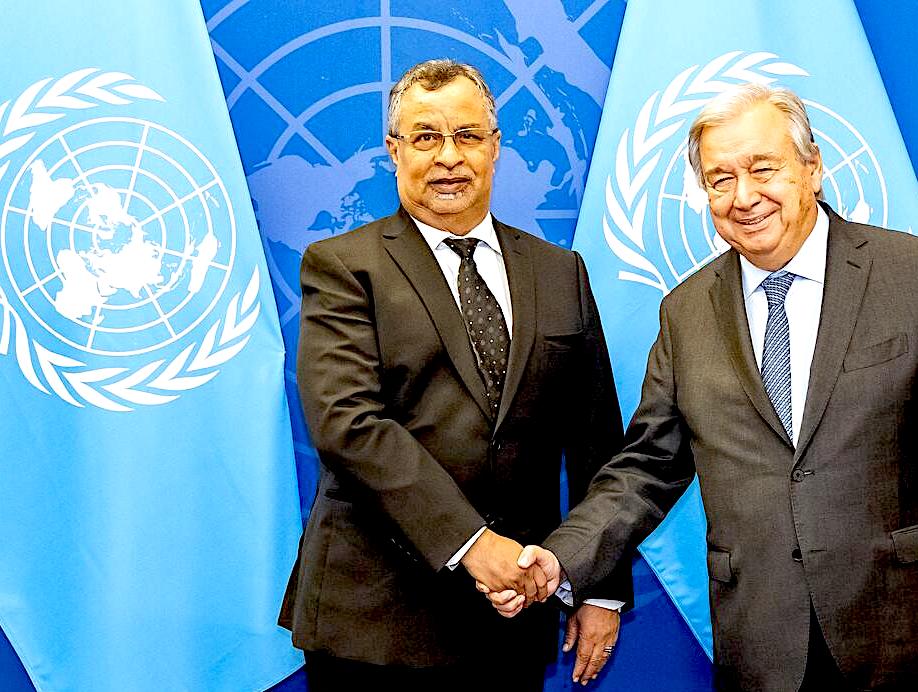
Secretary-General António Guterres, right, with Chad’s Foreign Minister Mahamat Saleh Annadif on Sept. 18. (UN Photo/Laura Jarriel)
By Pavan Kulkarni
Peoples Dispatch
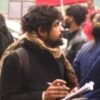 The killings and arrests of pro-democracy, anti-French protesters by the France-backed Chadian military government found no mention last week at an event held on the sidelines of the 78th session of the U.N. General Assembly.
The killings and arrests of pro-democracy, anti-French protesters by the France-backed Chadian military government found no mention last week at an event held on the sidelines of the 78th session of the U.N. General Assembly.
The “high level” event, “Journey towards constitutional order in Chad: Challenges & Perspectives,” was co-hosted in New York by the U.N. Development Programme (UNDP) and Chad’s Foreign Minister Mahamat Saleh Annadif.
Annadif was appointed by the military junta less than a week before Oct. 20, 2022, the original deadline for it to give up power to an elected civilian government. However, the election was not held. Instead military rule was extended by another two years on Oct. 1 by a political forum that was boycotted by the opposition.
Opposing the extension of military rule, protesters took to the streets on Oct. 20, 2022, in the capital N’Djamena, and other towns and cities across the country, raising slogans against the military junta, and its backer, France.
Even as it is willing to support a war against the popular military government of neighboring Niger, ostensibly to restore democracy, France maintains close ties with Chad’s military junta, which killed at least 128 people during the country-wide pro-democracy protests.
Three months ago, the government of Chad met protests with shootings, arrests, and incommunicado detention.
The violence was extreme and disproportionate, leaving scores dead and wounded, and hundreds detained without access to lawyers or family. https://t.co/dlJiGXT74k pic.twitter.com/g03kcDREMX
— Human Rights Watch (@hrw) January 23, 2023
The National Human Rights Commission of Chad (CNDH) reported earlier this year that 943 people were arrested, another 435 detained, and 12 disappeared in the crackdown on Oct. 20 of last year, which has come to be known as the “Black Thursday.”
Following a mass trial, boycotted by the Chad Bar Association which condemned it as a “parody of justice,” over 340 were sentenced to one-to-three years in the Koro Toro maximum security prison, deemed by the Chadian Human Rights League (LTDH) as the “Chadian Guantanamo.”
Without any mention of these atrocities at the U.N. event last week, the U.N. Deputy Secretary-General Amina Mohammed referred to this period of continued rule by the junta post-Black Thursday as the “last mile” of the transition — “the final sprint.”
Donate to CN’s Fall Fund Drive
At the end of this “final sprint,” the junta’s head and “transitional president,” General Mahamat Deby, will contest the election that will be overseen by his military government, contrary to his initial assurance that he will step down from power and not seek the office after the transition.
Without using the word “democracy” in her address, Amina Mohammed stressed the “need to stay the course to support and partner with Chad.”
French Influence
Other military governments formed after recent coups in Francophone Africa, especially those in Mali, Burkina Faso and Niger that are domestically popular for having ordered the French troops to leave, are facing aggressive posturing from the international community.
While economic sanctions targeting these countries adversely impact the everyday lives of its people, the managing director for operations at the World Bank, Anna Bjerde, reassured in her address that, “It is a pleasure to… represent the World Bank’s support to Chad.”
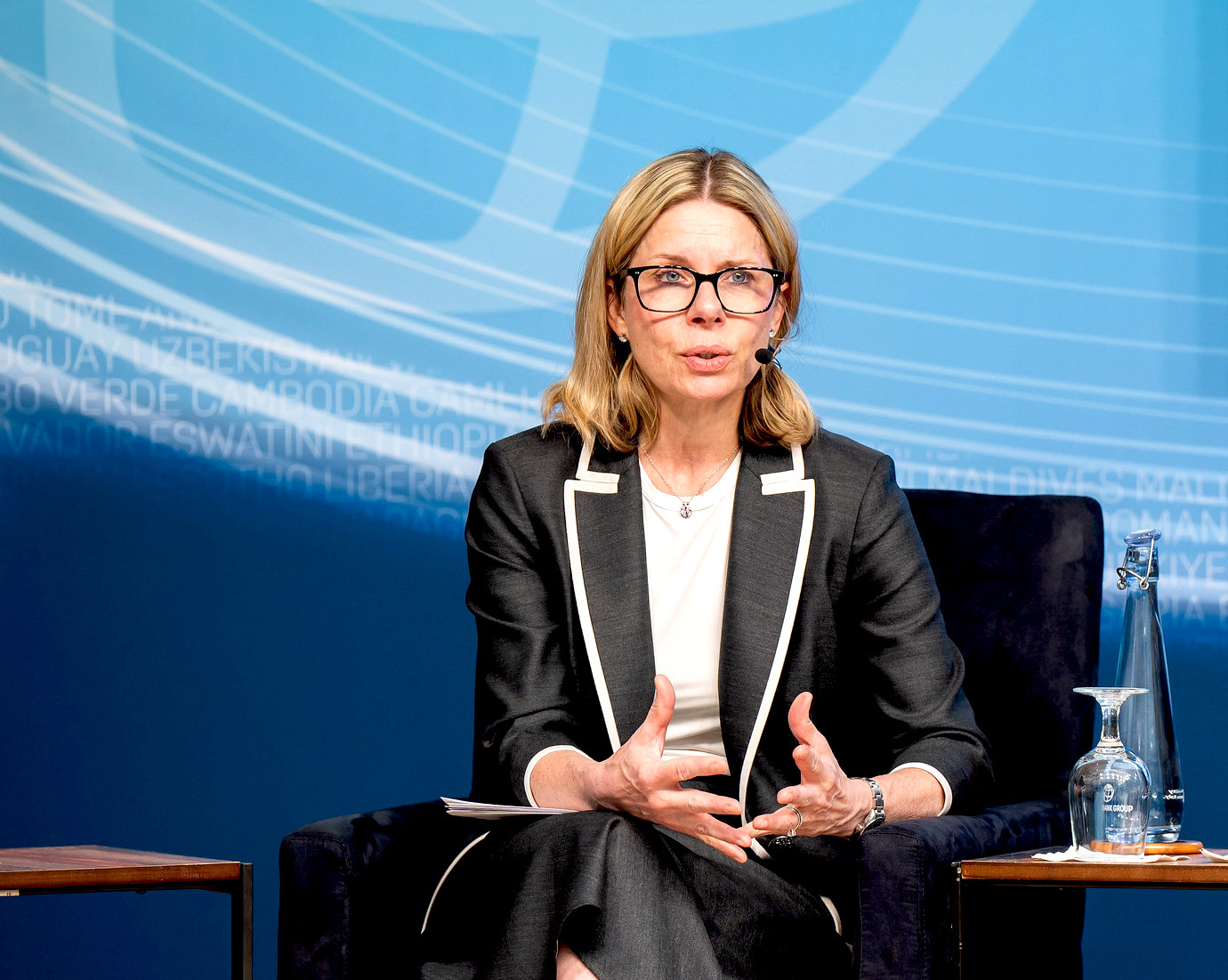
Anna Bjerde, managing director of operations for the World Bank Group, during the bank’s annual spring meeting on April, 13, 2023. (World Bank, Ian Foulk, Flickr, CC BY-NC-ND 2.0)
After France withdrew from Mali and Burkina Faso, and is now on the way out of Niger, Chad is the last Sahelian country whose government willingly continues to host a permanent French military base with about 1,000 troops in its capital.
“France influences the U.N. to adopt an exceptional and unusual policy towards the junta in our country,” said Mahamat Abdraman, asking how else the double standard in the treatment of different coup governments can be explained.
Abdraman is secretary general of the Rally for Justice and Equality of the Chadians (RAJET), which is among the seven political parties suspended for three months after the protests last year.
“The events of Oct. 20, 2022, have greatly impacted Chadian politics,” said Max Loalngar, president of Chadian Human Rights League (LTDH), who has been forced into exile by the state repression in the aftermath of the Black Thursday. “The regime is now visibly afraid of protests.”
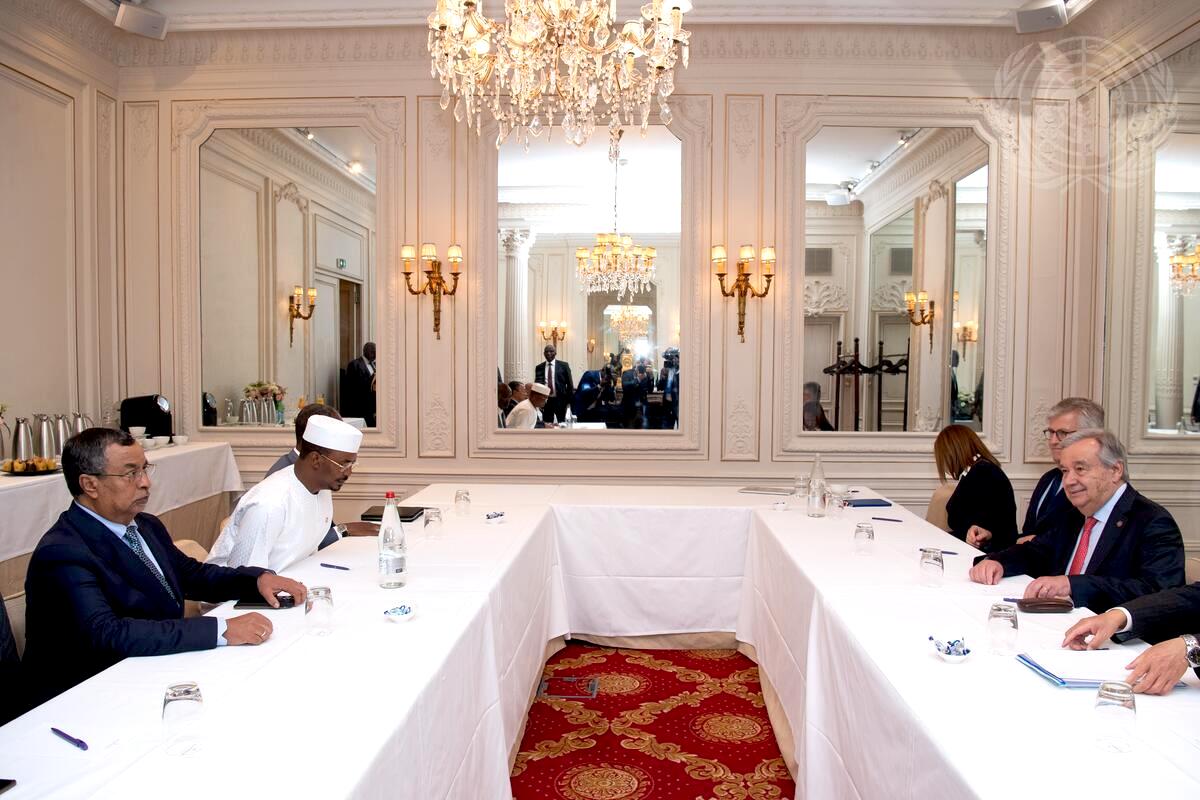
U.N. Secretary-General Guterres, right at table, with Chad’s Mahamat Déby, second from left, on the side of the Paris Summit on Global Finance, hosted by French President Emmanuel Macron, June 22, 2023. (UN Photo/Cyril Bailleul)
Loalngar is also the coordinator of Wakit Tamma (The Time Has Come), which identifies itself as an anti-imperialist platform, formed under the aegis of the Union of Trade Unions of Chad (UST) and the LTDH in February 2021. It was banned after the Black Thursday protests for having an “unnatural marriage” with political parties, from which it has had to distance itself by restructuring its organization in April.
“In plain sight of the international community,” Loalngar told Peoples Dispatch that the junta is exerting more draconian powers, including by issuing ordinances, “to suppress any form of citizen expression and public demonstration with violence.”
Only through heavy repression has the junta been averting more country-wide mass demonstrations since Oct. 20, he said.
Chad’s military junta was formed with France’s support in April 2021 by General Deby, who seized power in a coup after his father, the then President Idriss Deby, was killed while on a visit to the troops on the frontline of the fighting with rebel groups.
Idris Deby, former army chief and “a long-standing ally of France” who ruled Chad for over 30 years from 1990 till his death in 2021, was widely described as a dictator. At his funeral, French President Emmanuel Macron hailed him as “a great soldier” and a “courageous friend” of France. Macron went on to reassure his son, Mahamat Deby, of France’s support.
Mercenary Force Serving France
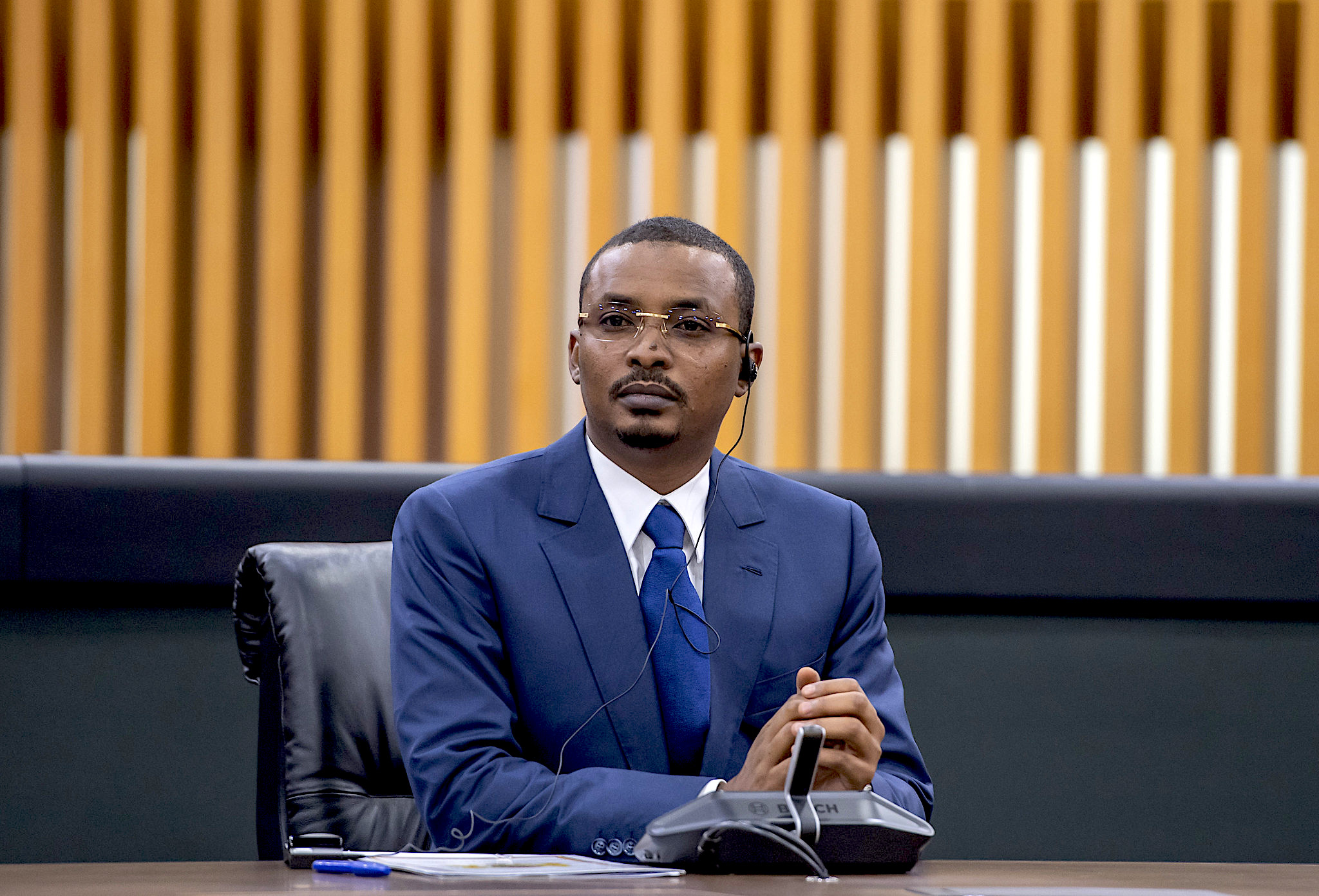
Mahamat Déby in Kigali, Rwanda, in March 2022. (Paul Kagame, Flickr, CC BY-NC-ND 2.0)
Barely two weeks before the renewed assurance of international support on the sidelines of the UNGA session last week, the Chadian army shot several protesters to disperse anti-French demonstrations in the city of Faya-Largeau.
About French 40 soldiers were reportedly stationed in the garrison France has maintained for 40 years in Faya-Largeau, the capital of Borkou Province in northern Chad. Angry protesters began surrounding it on Sept. 5, with several reportedly trying to break in, on learning that a Chadian soldier, 35-year-old Mahamat Dakou, had been shot dead inside by a French army medic.
French troops had “attempted to conceal the body, but information leaked,” Abdraman told Peoples Dispatch, adding that the protests it triggered “continued for three days,” before being violently put down by Chad’s army.
Soon after the protests began, Ahmat Toullomi, a member of the National Transitional Council serving as a parliamentarian under the junta’s rule, arrived outside the base to express solidarity. When confronted by Chadian army soldiers guarding the French garrison and dispersing the protesters, he was filmed in a heated argument, showing his parliamentary scarf to remind the soldiers that he had immunity.
Later on the night of Sept. 5-6, the army raided his home and arrested him, “disregarding his parliamentary immunity, under the fallacious pretext of flagrant misconduct,” Loalngar said. He has reportedly been charged with racism and xenophobia.
The junta leaders even “compelled the local traditional leaders to persuade or even force Dakou’s family into accepting compensation… to ease the tension as soon as possible,” added Abdraman. “Our army,” he said, is no longer “a true national army,” but has become a “mercenary” force, serving the French under Deby’s command.
The Borkou Province governor, General Ali Kebir, along with French authorities, told the media that Dakou “was not in a normal state” of mind. He was accused of attacking the French medic with a scalpel, forcing the latter to defend himself by opening fire, allegedly at point-blank range.
Abdraman disputed this official version, insisting that “Dakou was indeed of sound mind at the time of his assassination,” and had only retaliated against the French medic on being insulted and slapped when he was seeking treatment for an infected finger. “No concrete evidence of the soldier’s mental illness has been presented,” said Loalngar, adding that if Dakou was in fact mentally ill, that only makes his “murder” by the French medic “even more abhorrent.”
‘Pressure Cooker’
While the circumstances of his killing are disputed, the militant protests it instantly triggered illustrate that underneath the relative stability Deby’s regime has maintained on the surface since Black Thursday, there is, what Loalgnar called, “a pressure cooker ready to explode.”
The “tension” between Chadians and their former colonizer “can escalate from one day to the next,” said Abdraman.
[Related: The Alliance of Sahel States and Pepe Escobar: No Respite for France as ‘New Africa’ Rises]
The support provided by France to Mahamat Deby was the proverbial “last straw that broke the camel’s back,” unleashing “anti-French sentiment, which had been latent for decades,” Loalgnar said.
Anti-French slogans and placards have been a part of “all protests” since, including the major ones in February 2022 when “French flags were dragged on the ground” and “set on fire,” and again in May 2022, when “we ended up in prison with five other comrades.”
More protests against the junta are “planned throughout the country,” Abdraman said. “The support of powerful nations” mobilized by France for Deby’s “dynastic junta, will not discourage us,” he added, expressing confidence that there will soon come the day when “France won’t be able to stay in Chad any longer.”
Pavan Kulkarni is a journalist with Peoples Dispatch who covers labor struggles and progressive social movements, mainly on the African continent, but also in India.
This article is from Peoples Dispatch.
The views expressed in this article may or may not reflect those of Consortium News.
Donate to CN’s
Fall Fund Drive



States are selective about their moral facts. And fail to see the consequences of their behaviour – and the consequences.
Sixty years ago, the country was festooned with signs, sponsored or at least inspired by the John Birch Society, which stated ‘GET THE US OUT OF THE UN AND THE UN OUT OF THE US’. The Birchers were regarded as far-right extremists then, but their views are quite mainstream today. However, I don’t see the signs anymore. This is because, IMHO, the US has over the the last 50 years turned the UN and all of its affiliates into US Empire stooges. Now, it is the rest of us who should be pushing for this now useless organization’s demise. It occupies 17 acres in NYC. One can imagine a lot of housing for New Yorkers priced out of any decent living conditions being created on that 17 acres.
In 2021 elections were completed, both for parliament and presidency, but about a week later Idris Deby was allegedly murdered by a rebel group from Saharan region. Instead of scheduling next elections, the generals created a junta and elected Mahamat, the son of Idris as the junta leader. This suggests that after Idris death, generals were not confident that they can repeat the election successfully. Ca. 30 years go, Idris Deby switched from being a rebel supported by Libya to coup leader supported by France, and 6 year later regular election cycle started. Not-withstanding irregular succession, France and EU almost instantly ratified the result, and as I suggested, this means that Mahamat Déby started as an unpopular leader with French/EU support